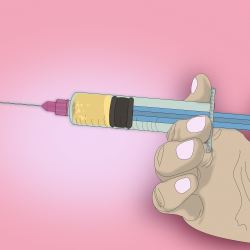In an effort to quell the spread of health misinformation, social media company Pinterest is thwarting the capacity to make vaccine-related searches on its platform. Discovering that a lot of unsubstantiated materials that go against current medical guidelines were rampant, they started halting such interactions until they can optimize their technology to decipher the difference. Given first-time parents tend to arrive at the pediatrician’s office with a host of preconceived notions on the subject - acquired through any number of influences albeit media and digital outlets or peers, these actions, if contagious in the industry, could free up office time from debunking myths to addressing actual existing health concerns and vital prevention measures.
And, think about how an epidemic of good information could serve parents emotionally - which extends to the entire family unit. Having a child carries a weight of worry not previously experienced, so it is completely normal for new parents to be intermittently consumed with doing what is in their child’s best interest. Even the most well-intended when deluged with alarmist, erroneous and often scary medical misinformation will be somewhat to more significantly adversely impacted.
Yes, the question of free speech is an invaluable one, but not the crux of this piece. For now, until the company can acceptably decipher the difference, not having anything other than reference to legitimate recommendations like that of the World Health Organization (WHO) is a reasonable effort as they take a pause - it will confer less harm.
As a physician, the concept that well-informed data and sources in the medical realm could abound in the public sphere represents an unimaginable dream. Even knowing a shift that marginalizes false, unnecessarily alarmist information and bolsters reliable data would be a dream. So, let me bask in it for a moment. Doctors went into practice to help patients. Between onslaughts of television false claims and beyond whether with respect to phony supplement cure-alls or cancer remedies, so much of why a patient needs to be seen gets co-opted.
The greatest healthcare resource is time. Anything that frees up time between doctor and patient allows the emphasis to be on assuaging suffering and treating or preventing disease.
Though Google and Facebook maintain a similar position on “fake news,” it appears Pinterest is and has been demonstrating the hardest line on the topic. As per Fortune,
“The platform has openly barred the “promotion of false cures for terminal or chronic illnesses and anti-vaccination advice” since creating its health misinformation policy in 2017.”
“If a search returns largely polluted results that violate our policies, we will stop serving the query, either temporarily or permanently,” a spokesperson from Pinterest told Fortune via email. “We started blocking certain searches related to vaccinations and cancer cures last year because results were leading to harmful misinformation.”
As these tech entities start to refine their processes in a manner that hopefully balances the preservation of freedom of expression with amplifying medically accurate information, let’s hope they can offset the destructive personal and financial costs such false claims cause. The burdens to our health system have been vast by not doing so. This moratorium might offer a poignant reset.
Note(s):
Disclosure: I am an alumni of the Research Science Institute (RSI) sponsored by the Center for Excellence in Education (CEE). So is a co-founder of Pinterest, Ben Silbermann. But, we were not there at the same time.

